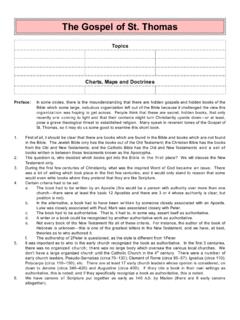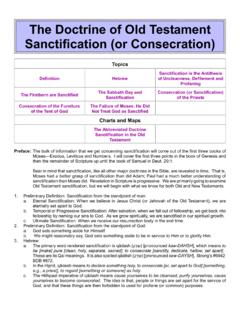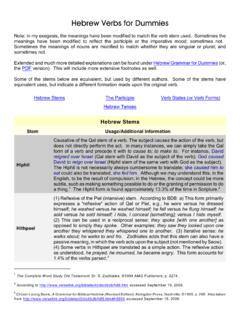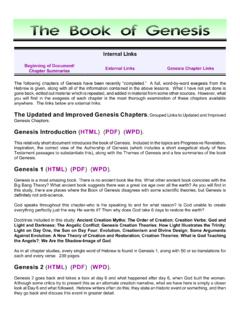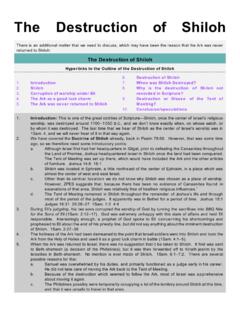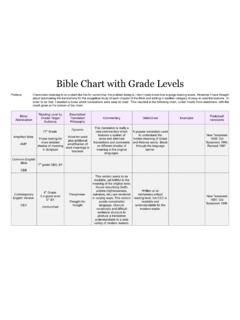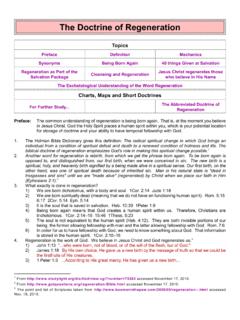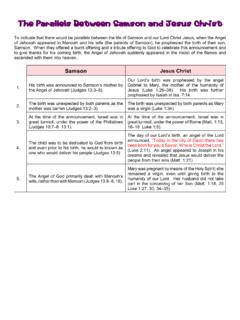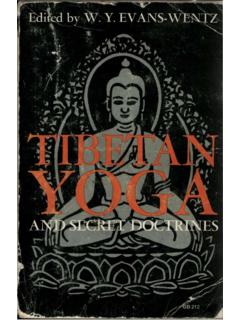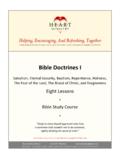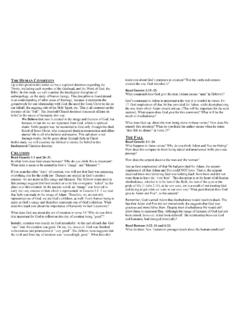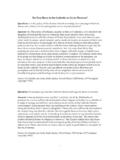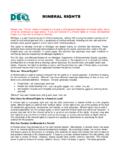Transcription of Ishmael - Kukis
1 Ishmael was born to Abram, the father of the Jewish race, and to Hagar, the maid of Sarai, Abram's wife(Gen. 16:1, 15 Acts 7:2). of Ishmael 's parents believed in Jesus Christ (Gen. 15:6 16:13). primary unconditional covenants to Abraham would be fulfilled through his son by Sarah (Gen. 17:15 19,21 Rom. 9:7). circumcised Ishmael ; since circumcision is an outward demonstration of inward faith, this meansthat Ishmael was likely a believer in Jesus Christ (Gen. 17:10 14, 23 Rom.:28 29 4:9 12) was 86 when he sired Ishmael and 99 when Isaac was born. He had hoped that God would fulfill Hiscovenant through Ishmael (Gen.)
2 16:16 17:1, 17 18). would be the father of a great nation and he would have descendants too many to count (Gen. 16:1017:20). would also be a wild ass of a man (Gen. 16:12). , during a celebration of the weaning of Isaac, rather than treating him with the affection of a youngerbrother, mocked the ritual (Gen. 21:8 9). of Ishmael 's lack of discipline and lack of natural affection, God allowed Sarah to finally force themfrom their periphery (Gen. 21:10 12). was blessed by God due to blessing by association with Abraham, a mature believer (Gen. 21:13). provided living grace (basic necessities) for Ishmael and Hagar, but He spoke to Hagar because Ishmaelwas out of fellowship from at least Gen.
3 21:9 on (Gen. 21:14 20). and Ishmael reunited, temporarily, at the death of their mutual father Abraham (Gen. 25:8 9). Abraham was emotionally involved with Ishmael at first (Gen. 16:18) he later adjusted to the fact thatthe descendant through whom the promise was made was Isaac (Gen. 25:5). had twelve sons and lived to the ripe old age of 137 (Gen. 25:12 17). predicted in Gen. 16:12, the descendants of Ishmael would dwell nearby the descendants of Isaac, indefiance of them between Havilah and Shur (Gen. 25:18). We do not know where Havilah is (and this is notHavilah of the antediluvian age). Shur is, as is described in this verse, just east of Egypt.
4 In order for theIshmaelites to live in defiance of their half brothers, they must have lived on and near the boarders of southernand eastern Palestine. means God hears (Gen. 16:11). Twice, when Hagar cried out to God, God heard her and answeredher prayer (Gen. 16:6 9 21:14 21). God heard Ishmael ; if only Ishmael heard God. uses the contrast between Ishmael and Isaac (actually, between their mothers) to make a pointconcerning the difference between law and grace. He will draw an analogy where Hagar, Ishmael 's mother,represents the law and Sarah, Isaac's mother, represents God's grace: Tell me, you who want to be under thelaw, do you not listen to the law?
5 For it stands written that Abraham had two sons, one by the slave woman andone by the free woman. But the son by the slave woman was born according to the norm of the flesh and theThe Greek word used here is (all gore ), which is obviously transliterated into our language1allegory. We should not assume that the meaning of the transliteration of Greek word is the actually meaning ofthe Greek word. This word is a hopoxlegomena in the truest sense; it occurs only here in the NT and not at all inthe LXX. It is used by several later Hellenistic writers, however, and by Philo and Josephus. This is used inreligious writings as a situation when a purely literal account is taken and a deeper meaning is developed from thataccount.
6 The Stoics took Hesiod's and Homer's myths of the gods and gave an interpretation to the storiespresented; this would be an example of them allegoreo'ing. This does not mean that the original story is a myth,but that there is more meaning which can be developed beyond the literal of the free woman through the promise. This is an analogy for [you see] these [women] are two1covenants, one from Mount Sinai bearing children who are slaves; she is Hagar. Now this Hagar is MountSinai in Arabia, an corresponds to the present Jerusalem, for she is in slavery with her children. But theJerusalem above is free; she is our mother.
7 For it stands written, "Rejoice, barren woman, who does not bear;break forth and shout, you who are not in labor; for more are the children of the desolate than of the one whohas a husband." And you, brothers, like Isaac, are children of promise. But as at that time he who was bornaccording to the flesh persecuted him according to the norm of the Spirit, so it is now also. But what does theScripture say? "Cast out the bondwoman and her son for the son of the slave woman shall nor be an heir withthe son of the free woman." So then, brothers, we are not children of a slave woman, but of the free law condemns us to slavery to the law; if we chose to follow the letter of the Law, we chose to remainslaves to the Law.
8 If we chose to be sons of God through the promise, through God's grace, we are free. Ourtrue spiritual heritage is that of the son of Sarah, the free woman. I am not ready to substantiate the following at this time, it is likely that Ishmael 's descendants beganliving on the southern and eastern boarders of Palestine, and expanded west and south, away from Palestine,intermingling with the Egyptians at times, and occupying, in general, Arabia, along with certain of the sons ofCush, namely Seba, Havilah, Sabtah, Sheba, and Dedan. There are also some descendants of Joktan (fromthe line of Shem) and descendants of Nahor, Abraham's uncle(?), who are found associated with Arabia.
9 Arabgenealogists trace their own heritage back to Ishmael and Abraham; tragic that they would choose to beidentified with the sons of the slave woman or the sons of the free woman, which is by faith in Jesus of the names of Ishmael 's sons are found in Assyrian records as tribes. 's descendants would long be a thorn in the side of Israel (Gen. 16:11 12 I Chron. 1:29 31 5:19). Arab merchants who bought Joseph as a slave from his brothers were identified as Ishmaelites and lateras Midianites, a more specific tribe in Arabia (Gen. 37:25 28 39:1).
